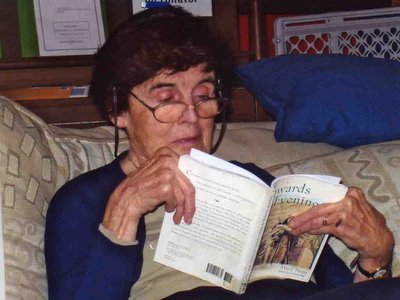My dad was an actuary; my mom was a housewife who became a history teacher and activist after I left home. I have 5 brothers, 18 months, 3 years, 7 years, 11 years, and 13 years younger. All married relatively young; one brother divorced and remarried. They have 6, 0, 2, 1, and 2 children respectively. Two are grandpas, one with 5 grandkids, the other with 2. There is a lawyer, a chemistry professor, a teacher, a nurse, and an accountant. They live in Maine, upstate NY, North Carolina,
Westchester NY, and Long Island NY.
Taking care of my toddler grandson Nate three days a week, I have recaptured many memories of my brothers as small boys. Growing up, I was extremely close to my brothers; we spent most of our free time together. We loved the beach, ice skating, roller skating, tree climbing, summer vacations, backyard baseball, touch football, and badminton. We played endless ping pong and knock hockey games, card games, Monopoly, and Scrabble. We had the biggest backyard on the block, and our house was always the neighborhood hangout. We had a basketball hoop attached to the garage that was in use day and night. There were no girls on the block, so I always played with the guys. I was passionately interested in baseball, and my brothers used to challenge their friends to ask me a baseball question I couldn't answer.
Looking back, the siblings might have relied on each other too much. Richard, Stephen, and I were not very social; each of us had one best friend and two good ones. We never hung out with a group of peers. We always had each other to play with, argue with, compete with. We always defended our siblings against our parents and against neighborhood bullies. Except for Bob (the 4
th child), we never dated in high school.
Rationality, intellect, and academic achievement were the family values, and we all honored them. Competitiveness was subtly encouraged even though my mother would occasionally inveigh against it half-
heartedly. Sarcasm and teasing were prevalent; the victim was expected to take the joke. Excessive emotion was scorned; I cried
alone in my room. I still find it absolutely humiliating to cry in public and feel critical of women who do. Except for my parents' deaths, I have virtually no members of my brother's crying past 3 or 4.
The possibility of my dad's crying was unimaginable. My mother, who had 5 brothers too, always choked back her tears.
We ere encouraged to rejoice in how different we were from most people in our working-class suburban town. We were the intellectuals. When working summers as mail carriers, Richard and Stephen reported that no other families seem to subscribe to the same magazines me read. My dad strongly encouraged us to think for ourselves and not care what other people (except each other) thought. He pointed that the most people were too preoccupied with their own problems to think much about you. My brothers might not be much use for discussing emotional issues, but for intellectually stimulating, challenging conversations, they are terrific.
My brothers can see each other for the first time in 6 months and spend the evening discussing politics, not their personal lives. My brothers insist that they don't have to talk to their siblings frequently to stay close. Each is certain he would come through in a crisis, and their track record is excellent. We all seem very interested in what the others are doing, but as long as my mom was alive, my brothers would ask my mom instead of calling their brothers. Now I have moved in that family switchboard role.
We still influence each other tremendously. We very much want our siblings' approval. Andrew, the chemistry professor, has been very opinionated about the college and career choices of his nieces and nephews. I have been amused and touched by how each of my brothers checked out my daughters' prospective husbands. We freely borrow each other's expertise. I was worried that the family would scatter after my mom died, but we all have attended the second generation's numerous weddings and sibling milestone birthday parties.
There is now a younger generation; three of us are thriving as grandparents. My parents would have 3 great grandchildren, with 3 more on the way. Everyone adores the babies and showers them with attention and love.
We have always had a strong family identity--intelligent, independent, well-educated, critical, autonomous. Marrying a gorgeous bimbo was not an option for my brothers. When we get together, we all have a good time. We have the same sense of humor, vote for the same candidates, enjoy the same movies. We all take pride in the academic and career success of the second generation. I am aware to what extent this pride in intellectual achievement is a defense against social insecurity and sets us apart from other people. Thankfully, our children have not inherited that limitation.
Having 5 younger brothers has probably shaped me more than any other single influence. I like and sometimes actually understand men and invariably defend them to women. I loathe men-bashing. Until I became a mother, I was far more comfortable in a group of men than a group of women. I enjoyed being the only girl in my political science classes at Fordham, while I was miserable in a girls' Catholic college in freshman year.
I did not consciously want sons. I always told people my 4 girls were my reward for 5 brothers. I always wanted a sister and am sometimes envious of my daughters' closeness. But I love taking care of a grandson and talking to little boys in the playground.


